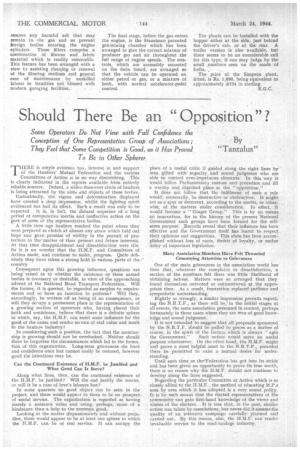Should There Be an " Opposition" ?
Page 32

If you've noticed an error in this article please click here to report it so we can fix it.
THERE is ample evidence tna. interest in and support of the Hauliers' Mutual Federation and the various Committees of Action is in no way diminishing. This is clearly indicated in the reports available frbm entirely tellable sources. Indeed, a wider-than-ever circle of hauliers is being attracted by the aims and objects of these bodies.
Undoubtedly, the vigour and determination displayed have created a deep impression, whilk the fighting spirit evidenced has had its effect. Such a result was only to be expected. It is, in fat, the rfatural sequence of a long period of comparative inertia and ineffective action on the part of some of the representative bodies.
A little time ago hauliers reached the point where they were prepared to clutch at almost any straw which held out hope and gave promise of virility in the pursuit of protection in the•matter of their present and future interests. At that time disappointment and dissatisfaction were rife. So it is no wonder that the H.M.F. and Committees of Action made, and continue to make, progress. Quite definitely they have taken a strong hold in various parts of the,.' country
Consequent upon this growing influence, questions are being" raised as to whether the existence of these named bodies is necessary or desirable, in view of the approaching advent of the National Road Transport Federation. Will the former, it is queried, be regarded as surplus -to requirements and so have no function to perform? Will they, accordingly, be written off as being of no consequence, or will they ocaupy a permanent place in the representation of a growing section of operators who, having placed their faith and confidence, believe that there is a definite sphere in which, say, the fLNI.F. can exert some influence for the good of the cause and render sei vice of real value and merit to the haulage industry?
In considering such a position, the fact that the membership is growing should not be overlooked. Neither should there be forgotten the circumstances which led to the formation of this organization. Long-term grievances die hard arid confidence once lost cannot easily be restored, however good the intentions may be.
Can the Continued Existence of H.M.F. be Justified and What Good Can It Serve?
Along what lines, then, can the continued existence of the H.M.F. be justified? Will the end justify the means, or will it be a case of love's labours lost?
In some quarters no good object can be seen in the project, and there would appear to them to be no prospect, of useful service. The organization is regarded as having merely a nuisance value and ueing, perhaps, more of a hindrance than a help to the common good.
Looking at the matter dispassionately and without prejudice, there would appear to be at least one sphere in which the H.M.F. can be of real service. It can occupy the place of a useful critic if guided along the right lines by' men gifted with sagacity and sound judgment who are able to control over-impetuous elements. In this way it would folloe Parliamentary custom and procedure and fill a worthy and dignified place, ae the "opposition."
It does not follow that the fulfilment of such a role would, necessarily, be destructive or obstructive. It might act as a spur or deterrent, according to the merits, or other, wise, of the matters under consideration. In effect, it would become " Ginger Group." This is by no mons an innovation, for in the history of the present National Government such groups have been formed for the selfsame purpose. Records reveal that their influence has been effective and the Government itself has learnt to respect their opinions and suggestions. This state_ has been accomplished without, loss of caste, forfeit of loyalty, or undue 'delay of important legislation.
Many Association Members Have Felt Thwarted Concerning Attention to Grievances One of the main grievances in the association world has been that, whatever the complaint or dissatisfaction, a section of the tnerribers felt there was little likelihood of obtaining redress. Matters were so arranged that they found themselves outvoted or outnumbered at the appropriate time. As a result, frustration replaced patience and sympathetic understandhig.
Rightly or wrongly, a similar impression prevails regarding the N.R.T.F.,` as there will be, in the initial stages at all events, the same association personnel in control, perhaps fortunately in those cases where they are men of good knowledge and sound judgment.
It is not intended to suggest that all proposals sponsored by the N.R.T.F.'should be pulled to pieces as a matter of course, in the spirit of the faction which is always " agin the Government." Such action would serve no useful purpose whatsoever. On the other hand, the H.M.F. might well prove a most helpful asset to the N.R.T.F., provided there be permitted to exist a mutual desire for understanding.
Until such time as the"Federation has got into its stride and has been given an opportunity to prove its true worth, there is no reason why the H,M.F. should not continue to develop along the lines suggested.
Regarding the particular Committee of Action which is so closely allied to the H.M.F., the method of educating M.P.s area by area which it has adopted is a very sound policy. It is by such means that the elected representatives of the community can gain first-hand knowledge of the views and wishes of the electors. It is true that, in the past, similar action was taken by associations, but never did it assume the quality of an intensive campaign carefully planned and carried out. By this means, also, the H.M.F. can render invaluable service to the road-haulage industry.




















































